- Home
- David Pilling
Caesar's Sword (I): The Red Death Page 11
Caesar's Sword (I): The Red Death Read online
Page 11
To me the dromons appeared too small and flimsy for warships, though I refrained from saying so. They were only big enough to contain twenty sailors and a single bank of oars, protected from enemy missiles by a wooden covering.
Narses seemed to share my opinion. “In the days of antiquity,” he sighed, drawing his furred cloak about him tighter against the morning chill, “Rome would have assembled a mighty fleet of biremes and triremes. You should have seen those ships, Coel. Multi-decked monsters stuffed with legionaries and armed with battering rams and ballistas.”
“As for the army,” he said ruefully, “we have come to depend on a rabble of foreign mercenaries. Belisarius has done his best, but it is a poor show, Coel, a poor show.”
“Fifteen thousand men, lord,” I ventured, “is still a host to be reckoned with.”
“Three legions. That is what fifteen thousand men amounts to. In the days of her glory, Rome would have not have sent anything less than twelve legions to conquer a territory as vast as North Africa. We are pygmies, standing on the shoulders of giants.”
I knew Narses had not summoned me to pour out his doubts and fears, and waited patiently for the dagger-thrust.
“The Empress wishes to see you in private,” he said abruptly, “I cannot imagine why, and there is not much that escapes my imagination. You knew her in a former life, is that not so?”
“Yes, lord,” I replied cautiously, “when I was at the Circus.”
Narses sniggered. “How Theodora hates to be reminded of her past. I try not to mention it in her presence more than two or three times a day. Perhaps she wishes to discuss old times with you. Were you friends?”
He placed a slight emphasis on the last word, and raised one of his carefully plucked eyebrows.
“Not as such, lord,” I said, “I had the opportunity to befriend her, but rejected it.”
His eyes widened, and he gave a low whistle. “Rejected,” he repeated, “oh dear. Not many dare to reject Theodora. She nurses grudges like her own children. Rather better, in fact. Is there anything else I should know?”
I hesitated, but only for a moment. “She had a dear friend of mine murdered. I have no proof of her guilt, but am sure of it.”
He placed a finger to his lips. “Hush. You are not the first to make such accusations. One does not rise from the gutter to an imperial throne without stepping over a few bodies on the way. Whatever ill-will you bear the Empress, I advise you to smother it.”
I nodded sullenly.
“Good. Now listen. I have told her that your presence on the expedition to Africa is necessary, but not why. The less that woman knows is better for everyone. The Emperor also knows nothing of your connection with the sword. Caesar possesses many virtues, but keeping secrets from his wife is not one of them. If the Empress asks you why Belisarius values you so much, tell her that he wishes to interrogate you about Britain and the customs of its people.”
“But I left my homeland when I was just a child,” I protested, “and remember little of it.”
Narses shrugged. “Then make it up, Coel. Invent. Theodora is an ignorant woman in many ways, and will not be any the wiser. Tell her the Britons like to paint their backsides purple, and go into battle wielding clubs made of dried dung. Appeal to her prejudices. Anything you like. Just don’t tell her the truth.”
He gave me a reassuring pat. “This is politics,” he said, “a dirty business, and one I spend my life wallowing in. Just do as I say, and you might get out of the audience chamber alive.”
I was escorted to the palace by a troop of guardsmen. Within an hour of meeting Narses I found myself standing in an upper-level chamber similar to Belisarius’s, and again overlooking the sea. Unlike the general’s sparse furnishings, this room was decked out like the chamber of a rich whore – which, of course, Theodora was.
The walls were covered in silk hangings and tapestries that depicted hunting scenes, the exploits of Achilles and Hector, and lovers walking naked among sylvan forests and ivy-grown ruins. Religious and devotional scenes were noticeably absent. Thick Persian rugs covered the floor, and a number of comfortable couches were arranged in a square in the middle of the room. The air was thick with the heady smell of incense. A silver door at the southern end of the room led to the Empress’s private bedchamber.
Theodora herself was spread out on one of the couches, and gazing out of the doorway that led to the balcony. The soft winds blowing in from the sea stirred the clingy purple gauze she was wearing and accentuated the well-fed curves of her body. She didn’t seem to notice our entrance until the captain of the guard stamped his feet and saluted. Only then did she turn her face away from the sea. Her eyes looked heavy, and she had clearly been drinking.
“Wait outside with one of your men,” she said to the captain, “dismiss the others, and don’t eavesdrop.”
Theodora’s voice was throatier than ever, and she stifled a little yawn as the soldiers filed out.
“Britannicus,” she said with a little smile, shading her eyes to get a better look at me, “is that really you? How different you look.”
I said nothing. She stretched out one bare arm and beckoned me closer.
“Don’t be so stiff,” she said crossly when I took a few hesitant steps towards the couch, “sit beside me, and have a cup of wine.”
“I prefer to stand, Majesty,” I replied, resorting to the soldier’s trick of not looking directly at a superior officer.
Theodora raised herself onto one elbow. Her thin robe was slashed almost to the waist, exposing the curve of her thigh. Doubtless she was used to men slavering over her body, but I found myself suppressing an urge to retch.
“What a dull man you are,” she said, stretching and giving another little yawn, “Belisarius should have recommended you for the church rather than the army. Why did he want a worn-out charioteer for a soldier?”
Crude and direct, you see, and typical of her. “I volunteered to fight for him during the riots, Majesty,” I replied, “perhaps he was impressed with my loyalty.”
Cold sweat prickled on my skin. My composure was starting to slip. I thought I could hear the shade of Felix, urging me to avenge his murder.
Theodora’s slender neck was within reach. Her guards had taken my sword, but the Heruli had taught me how to kill with my bare hands. Her death would be swift and easy. Mine, at the hands of the Emperor’s torturers, would be slow and agonising.
She sniffed, and poured out some more wine. “You and Belisarius are a pair,” she said contemptuously, “stiff-backed, dutiful bores. I daresay you will be very happy together. Why have you grown that ridiculous beard?”
“It is the custom of the Heruli to grow their beards, Majesty. I am one of them now.”
“How adaptable you are. First you were a Briton, then a Roman, and now a Germanic savage. You seem able to cast yourself in any mould. A man of many layers. Not so dull, perhaps.”
I swallowed, and decided to try and force the issue. “Majesty, I apologise if I ever caused you offence. It was unintended.”
She slugged down her wine. “I know what you refer to,” she said, belching and wiping the spillage from her bosom, “a certain cellar, on a certain night, during a former life. I have not forgotten. I forget nothing.”
Now her voice was hard as steel, and the mazed look had vanished from her eyes. “Nor do I forgive. I have endured many insults, Britannicus, and make it a point of honour to avenge them. Our account remains unsettled.”
Save for the body of Felix, fifteen years rotting in a shallow grave, I wanted to scream. I bit down hard on my lower lip, and dug my nails into my palms.
“I am a capricious woman, I know,” she said in a softer tone, “and have a deplorable tendency to toy with my victims. Like a cat. It would be amusing to have you consigned to the rack. To watch your life being wrung from you an inch at a time.”
“However, I am the Emperor’s consort, and must behave like one. Did you know it was I who persuaded my hus
band not to flee the city, during the riots? All those senators and soldiers were standing around, fouling their small-clothes in terror, and only I encouraged him to send Belisarius and Mundus out to fight. Thus the Empire was saved by a courtesan. Delicious, isn’t it?”
I assumed she was lying, but later discovered that the story was true. Theodora deserves credit for it, the first and last time she behaved in a manner befitting her station.
“An Empress must show clemency,” she said, “I am willing to forget past misdemeanours, if you agree to do something for me in return.”
“What is that, Majesty?” I asked, dreading the response.
“Spy on Belisarius for me. God knows why, but he seems to have some special regard for you. I can use that to my advantage. Get as close as you can to him during the voyage to Africa. Divine his secrets, read his private letters. Bring me back something that increases my knowledge of the man. Assuming, of course, that any of you return from this insane sortie.”
Her shameless proposal rocked me, and for a moment I struggled to speak.
“No, Majesty,” I said, striving to keep the rage out of my voice, “I will not be your spy.”
Her eyes narrowed to slits. “I am offering you a chance to save yourself, Britannicus. One chance.”
“I care nothing for your offer, or your threats. I am a soldier of Rome, not a traitor.”
I was beginning to enjoy myself. Like old Julius, I had crossed the Rubicon, and the rest was up to fate. It was worth dying, I decided, just to see this appalling bitch shaken out of her complacency.
“A soldier of Rome,” she said, her nose wrinkling in disgust as she looked me up and down, “the shades of our noble ancestors must be weeping in shame.”
That was rich, coming from one who had no more noble blood in her veins than a horse. I almost said so, but restrained myself.
Theodora flowed to her feet with a dancer’s grace. “I know where you derive this courage,” she said, folding her arms, “you think you can hide behind Belisarius’s shield.”
Our eyes locked. “Kill me, Majesty, or let me go,” I replied. I took a deep breath and stood poised, ready to spring.
Perhaps she sensed the danger, or realised that I had called her bluff. Even she could not simply have a man tortured to death on a whim, especially not one favoured by Narses and Belisarius. She might have him arraigned on some trumped-up charge, but there was no time for that. Besides which, she didn’t want me blurting out her disgusting proposal in court, before the Emperor and all his justices.
Even so, the halls of Hell would freeze over before Theodora admitted that she had lost. “Dismissed,” she said, with a flick of her finger, “go away, Britannicus. Far away.”
I gave a bow, turned on my heel and marched out, painfully aware that my back was exposed.
“It won’t be far enough, I promise you,” she cried, and then the door closed behind me.
Chapter 15
The fleet finally sailed from Constantinople on a blazing hot day in June, and I remember the funeral atmosphere among the citizens gathered on the harbour to watch the last troops file aboard the transports. The Emperor and the Patriarch came in procession down to the docks - thankfully, Theodora stayed in the palace - to watch us depart. Choirs marched behind them, waving holy icons and chanting solemn Latin dirges that did nothing to lift the atmosphere.
Many of those who witnessed the fleet depart thought that it would never return. There was good reason to be pessimistic. Ahead lay a journey of over a thousand miles of ocean into enemy-controlled waters, with no possibility of relief or reinforcement. If the fleet somehow managed to fight through the Vandalic battle-fleets, the army was then faced with the task of conquering and holding an entire continent. This would have to be achieved in the teeth of resistance from King Gelimer’s armies, estimated to number some thirty to forty thousand warriors.
The task appeared impossible, and Belisarius’s commission little more than a death-warrant. However, Justinian was not a fool, and his agents had been hard at work stirring up civil discontent in the Vandal provinces of Sardinia and Tripoli. With the help of a few secretly dispatched Roman troops, they encouraged pro-Roman uprisings that succeeded in driving out the Vandal governors and garrisons.
Gelimer took the bait. He split his forces and sent his brother Zano with a large army and a fleet to recapture their lost territories. This left the coasts of North Africa undefended, and reduced the Vandal military presence on land.
Justinian’s artful diplomacy also succeeded in driving a wedge between the Vandals and the Goths that ruled Italy. Believing Rome to be their friend, the Goths even granted our fleet permission to dock in Sicily on the voyage to Africa.
All this was so much rumour and hearsay to me as the fleet set sail. The doleful sound of the choirs and the wails of the multitude slowly faded away as the first of the transports glided down the straits of the Bosphorus.
I was aboard one of the Heruli ships, and very quickly discovered that a sailor’s life did not agree with me. The fleet was barely out into the open sea before the first pangs of sickness started to gripe in my belly. By the time it anchored at Heraclea to take on board a supply of horses, I was prostrate, unable to do anything except lie groaning on deck or retch feebly over the side. Many of my comrades were also affected, for the Heruli were not a seafaring people. Our ship soon became rank with the stench of vomit and excrement. The Egyptian sailors laughed at our weakness, and wondered aloud at how such mighty warriors would cope if the Vandals attacked us at sea.
Mercifully, the fleet remained at Heraclea for five days while the horses were taken on board. This gave me time to recover a little. From there we proceeded to Abydos, where a sudden drop in the wind delayed us for another four days.
At Abydos Belisarius made clear his intention to instil some old-fashioned Roman discipline into his ragbag army. Three of the Huns got into a drunken brawl, in which one of them was killed. As I have mentioned, such incidents were by no means uncommon among the foederati troops, and most Roman commanders let them go unpunished.
Belisarius had the culprits taken to the summit of a hill above the harbour, and there, in plain view of the fleet and army below, they were beheaded. This aroused the rage and indignation of their comrades, and a full-scale mutiny was only prevented when Belisarius personally harangued the troops from the foredeck of his galley.
“Those who allow a murder to go unpunished,” he bellowed, “become accomplices to guilt and partners to infamy. The criminals were drunk, which is no defence but an aggravation of their crime. Drunkenness, even when it leads to no harm, is outside the bounds of military discipline. I will march and fight alongside no man who has the blood of a comrade on his hands. Any further such crimes will meet with the same punishment. We are an army set on conquest, not a rabble.”
His words echoed around the harbour as they were taken up and repeated by the captains on the other ships. The speech was effective, though the Huns still grumbled, and Belisarius took advantage of a sudden breeze to put to sea again.
My sickness worsened as the fleet navigated around the headland of Cape Malea. It was unbearable. The endless pitching and rolling of the deck, even in a flat calm, the cramping of my empty guts, the dry retching, all made me pray for death. Dreadful as it felt at the time, my inability to eat might well have saved my life.
When the fleet reached the port of Methoni, Belisarius decided to give his fatigued and sickness-ravaged soldiers a few days of rest. He ordered the bread-sacks to be opened, only to discover that the bread had mouldered into a foul-smelling, virtually inedible paste.
This disaster was entirely due to the greed of John of Cappadocia, Justinian’s corrupt financial minister. He had been responsible for supplying the provisions of the fleet, and had ordered the bread to be only lightly baked in the fires of the public baths in Constantinople. Army bread was usually baked twice into a hard, biscuit-like substance. The loss of weight that the baking proc
ess caused was accounted for by a deduction of one fourth. By ordering the bread to be lightly baked, John kept for himself the deducted amount and also the fuel that should have been used in the fires.
Consider that this man, who placed his own profit before the health of the Roman army, was a chief minister of the state! The Empire was corrupted in body and soul, and the rise to office of such parasites as John of Cappodocia is proof of that corruption.
The soldiers were starving, and so the spoiled bread was foolishly distributed anyway, with predictably catastrophic results. Hundreds of men died from consuming it. Those like myself, still afflicted by sea-sickness and unable to keep any food down, were spared. Worse might have followed, and the entire expedition dissolved, had not Belisarius dipped into his own purse and hurriedly procured supplies of fresh bread in the town.
From Methone the fleet headed to the island of Zante, where it was delayed for another sixteen days. Our demoralised, half-starved, sickness-ridden soldiers were subjected to fresh hardships when the boiling heat of midsummer spoiled the casks of fresh water.
Fresh water was the only thing keeping me and my sick comrades alive. I can still taste the sour, lukewarm tang of the tainted stuff they made us drink instead. I clung to life by a miracle, but fresh sickness ravaged the Heruli and carried away a few more to the afterlife. My friend Girenas and his brother were among the casualties. Their bodies were consigned to the watery deep and their souls to Christ, though I suspect they would have preferred to spend eternity in Woden’s feasting halls.
Our fleet limped on to the island of Sicily and made landfall at Caucana. The landing place, a rocky plain of lava that stemmed from the base of Mount Etna to the sea, was a bare and exposed spot. Belisarius was resolved to advance no further to the coast of Africa until he had some idea of where the Vandal armies were camped.

 The Growth Delusion
The Growth Delusion The Hooded Men
The Hooded Men Longsword
Longsword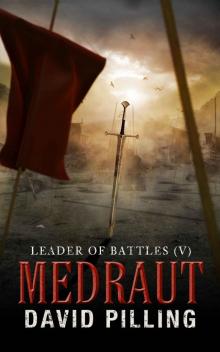 Medraut
Medraut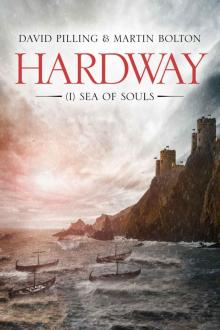 Hardway
Hardway Holy Warrior
Holy Warrior Caesar's Sword: The Complete Campaigns
Caesar's Sword: The Complete Campaigns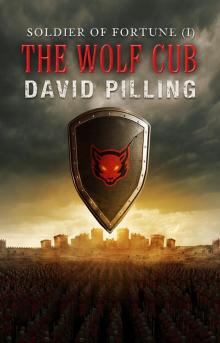 The Wolf Cub
The Wolf Cub Reiver
Reiver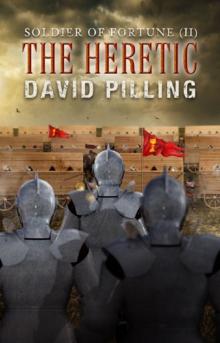 The Heretic
The Heretic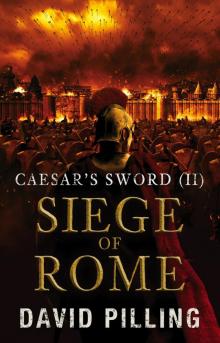 Siege of Rome
Siege of Rome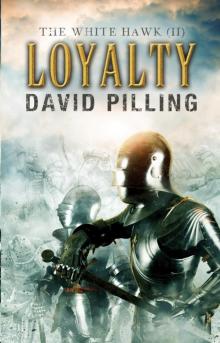 Loyalty
Loyalty The Path of Sorrow
The Path of Sorrow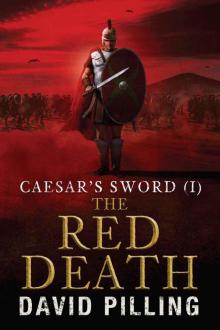 Caesar's Sword (I): The Red Death
Caesar's Sword (I): The Red Death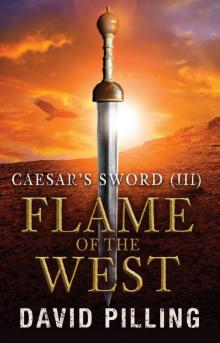 Flame of the West
Flame of the West The Best Weapon
The Best Weapon Sacrifice
Sacrifice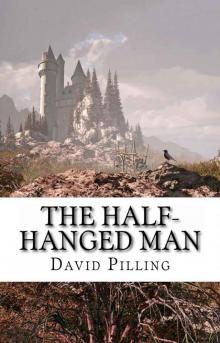 The Half-Hanged Man
The Half-Hanged Man